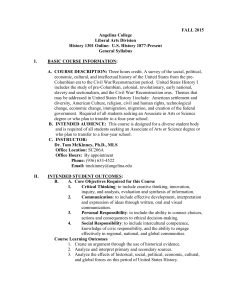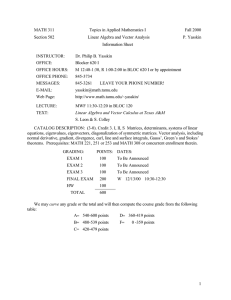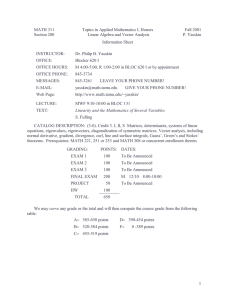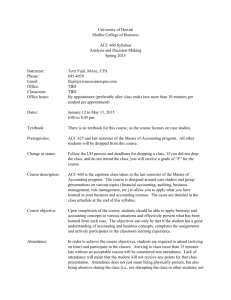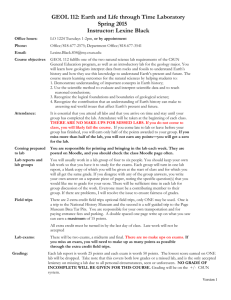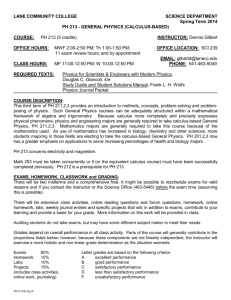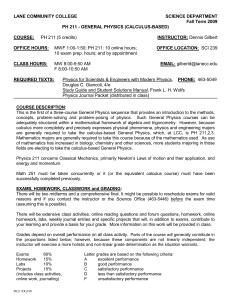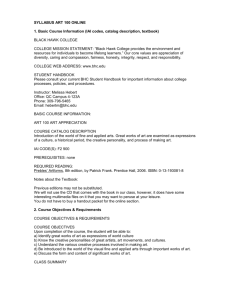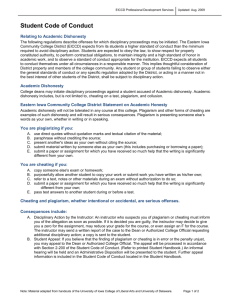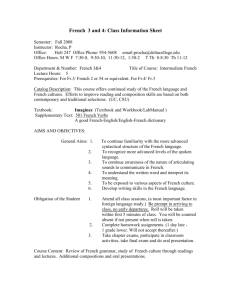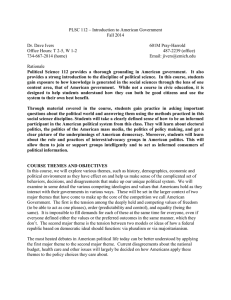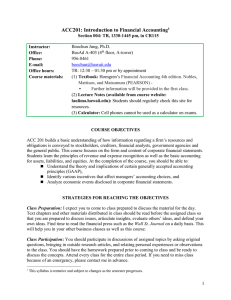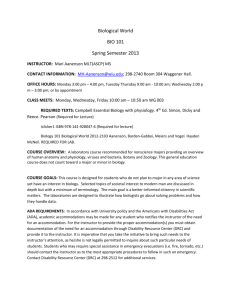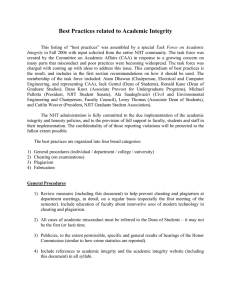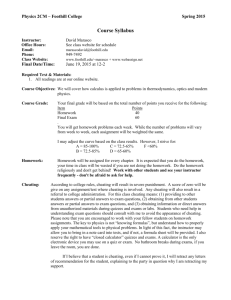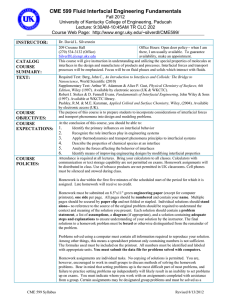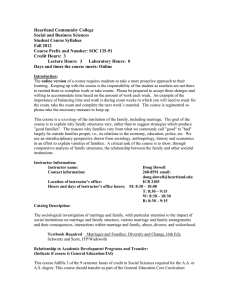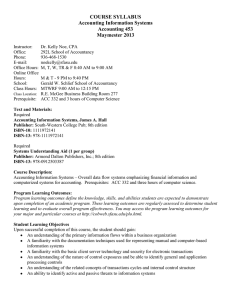- Shidler College of Business
advertisement
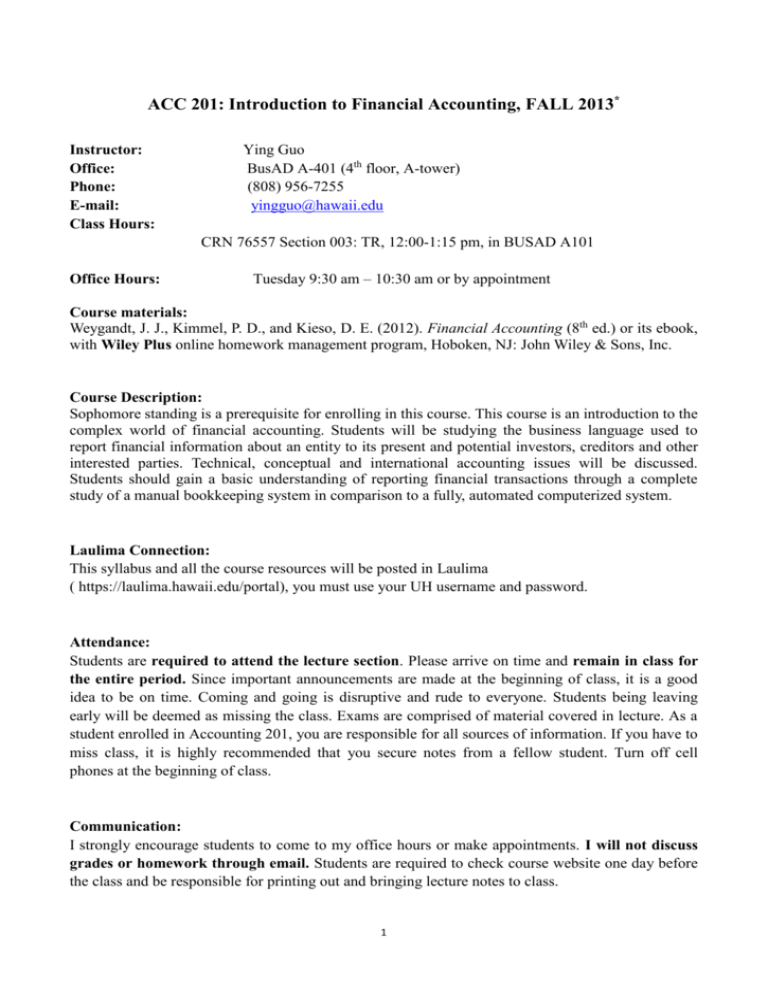
ACC 201: Introduction to Financial Accounting, FALL 2013* Instructor: Office: Phone: E-mail: Class Hours: Ying Guo BusAD A-401 (4th floor, A-tower) (808) 956-7255 yingguo@hawaii.edu CRN 76557 Section 003: TR, 12:00-1:15 pm, in BUSAD A101 Office Hours: Tuesday 9:30 am – 10:30 am or by appointment Course materials: Weygandt, J. J., Kimmel, P. D., and Kieso, D. E. (2012). Financial Accounting (8th ed.) or its ebook, with Wiley Plus online homework management program, Hoboken, NJ: John Wiley & Sons, Inc. Course Description: Sophomore standing is a prerequisite for enrolling in this course. This course is an introduction to the complex world of financial accounting. Students will be studying the business language used to report financial information about an entity to its present and potential investors, creditors and other interested parties. Technical, conceptual and international accounting issues will be discussed. Students should gain a basic understanding of reporting financial transactions through a complete study of a manual bookkeeping system in comparison to a fully, automated computerized system. Laulima Connection: This syllabus and all the course resources will be posted in Laulima ( https://laulima.hawaii.edu/portal), you must use your UH username and password. Attendance: Students are required to attend the lecture section. Please arrive on time and remain in class for the entire period. Since important announcements are made at the beginning of class, it is a good idea to be on time. Coming and going is disruptive and rude to everyone. Students being leaving early will be deemed as missing the class. Exams are comprised of material covered in lecture. As a student enrolled in Accounting 201, you are responsible for all sources of information. If you have to miss class, it is highly recommended that you secure notes from a fellow student. Turn off cell phones at the beginning of class. Communication: I strongly encourage students to come to my office hours or make appointments. I will not discuss grades or homework through email. Students are required to check course website one day before the class and be responsible for printing out and bringing lecture notes to class. 1 Grading Each student’s course grade will be based on the following: Mid-term exam I Mid-term exam II Final Assignments Quizzes Attendance Total 20% 20% 30% 20% 5% 5% 100% There are no predetermined quotas for any letter grades. For your information, the grade distribution for this course has been approximately: 15% A’s, 30% B’s, 40% C’s, 10% D’s and 5% F’s. Plus/minus grades are given in the course. Class Assignments: Since accounting is an applied discipline, it is important that you learn the “how to” of accounting as well as “know about” accounting. Therefore, it is important that you complete the exercises and the problems that are assigned. Homework is 20% of your grade and must be completed online in WileyPLUS (https://www.wileyplus.com/WileyCDA/) by the assigned deadlines. The homework is graded based on the completeness and correctness, so please try your best on the homework. Most of the homework problems will be discussed during the lecture or the answer keys will be provided. Examinations: Examinations are multiple choice questions. Exams will be closed-book and closed-note. There will be two mid-term exams and one final exam. Students are expected to be present on exam days. If you will be missing an exam, be sure to notify the instructor BEFORE the exam is administered. No make-ups will be allowed without PRIOR written approval by the instructor and/or written verification of an emergency. Proper documentation for the absence must be required. When allowed, make-up exams will be scheduled at the discretion of the instructor. Make-up exams are more rigorous, are graded to a higher standard than the original exam, and do not offer bonus points or additional credits of any kind. If you believe that there is an error in the grading of an exam, bring it to my attention within two weeks of the date the exam is returned to the class. You will need a pencil and simple calculator. You can NOT use your cell phone or a computer as calculator. 2 Tentative Lecture and Exam Schedule: Week Date 1 1 2 2 3 3 8/27/2013 8/29/2013 9/3/2013 9/5/2013 9/10/2013 9/12/2013 4 4 9/17/2013 Ch4 9/19/2013 Ch4 5 5 6 6 9/24/2013 9/26/2013 10/1/2013 10/3/2013 7 7 8 8 9 9 10/8/2013 10/10/2013 10/15/2013 10/17/2013 10/22/2013 10/24/2013 10 10 Final Topic Note Introduction/ Ch1 Ch1 Ch2 Ch2 Ch3 Ch3 Last day to drop courses/switch sections without "W" grade Sept. 4 is the last day to register/add courses Review Exam 1 (Ch1-Ch4) Ch5 Ch5 Ch6 Ch6 Ch7 Ch7 Ch8 Ch8 11 11 12 12 10/29/2013 Review 10/31/2013 Exam 2 (Ch5-Ch8) 11/5/2013 Ch9 11/7/2013 Ch9 11/12/2013 Ch10 11/14/2013 Ch10 13 13 14 14 15 15 11/19/2013 11/21/2013 11/26/2013 11/28/2013 12/3/2013 12/5/2013 16 16 12/10/2013 Ch13 12/12/2013 Review Oct. 25 is the last day for in-person restricted withdrawals with "W" grade. Ch11 Ch11 Ch12 No Class Ch12 Ch13 Thanksgiving Day Last date of instruction 12/17/2013 12:00-2:00 pm Final for CRN 76557 Section 003 *Note: Instructor reserves the right to make reasonable changes as necessary to this syllabus throughout the semester 3 Course Compliance with Various Campus Policies: All University of Hawaii and Shidler College of Business rules and policies will be followed in the course. Alternate Meeting Place: In the event of any disturbance requiring the evacuation of the CBA, you are to meet the instructor at Zone 2 Parking lot. At that time, further instructions will be given (if an exam is in progress, you will be notified of an alternate room to complete the exam). Students with Disabilities: Any student who has a documented disability and requires accommodations is strongly encouraged to contact me or the KOKUA Program located in Room 13 on the first floor of the Student Services Center (also contact Ann Ito, KOKUA Program Director at 956-7511). Academic Honesty: Cheating and Plagiarism will not be tolerated. All incidents will be handled in accordance with the UH Student Code of Conduct. The UH Student Code of Conduct, is available at: http://www.hawaii.edu/student/conduct. The most relevant portions are included below for your convenience. Because UHM is an academic community with high professional standards, its teaching, research, and service purposes are seriously disrupted and subverted by academic dishonesty. Such dishonesty includes cheating and plagiarism as defined below. Ignorance of these definitions will not provide an excuse for acts of academic dishonesty. Be sure to read the following definitions for plagiarism and cheating. Cheating: includes but is not limited to giving or receiving unauthorized assistance during an examination; obtaining unauthorized information about an examination before it is given; submitting another’s work as one’s own; using prohibited sources of information during an examination; fabricating or falsifying data in experiments and other research; altering the record of any grade; altering answers after an examination has been submitted; falsifying any official University record; or misrepresenting of facts in order to obtain exemptions from course requirements. Plagiarism includes but is not limited to submitting, in fulfillment of an academic requirement, any work that has been copied in whole or in part from another individual’s work without attributing that borrowed portion to the individual; neglecting to identify as a quotation another’s idea and particular phrasing that was not assimilated into the student’s language and style or paraphrasing a passage so that the reader is misled as to the source; submitting the same written or oral or artistic material in more than one course without obtaining authorization from the instructors involved; or “drylabbing,” which includes obtaining and using experimental data and laboratory write-ups from other sections of a course or from previous terms. Classroom Behavior: Both students and faculty have responsibility for maintaining an appropriate learning environment. Students who fail to adhere to behavioral standards may be subject to discipline. Faculty must treat students with understanding, dignity and respect, to guide classroom discussion and to set reasonable limits on the manner in which students express opinions. 4
